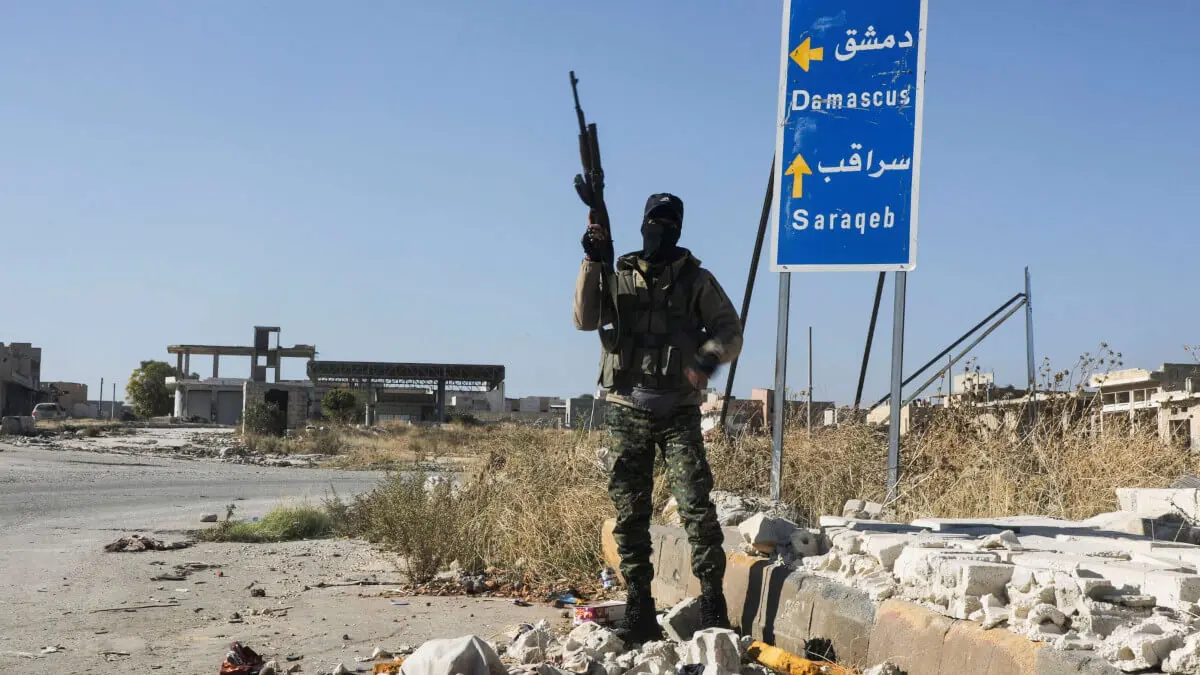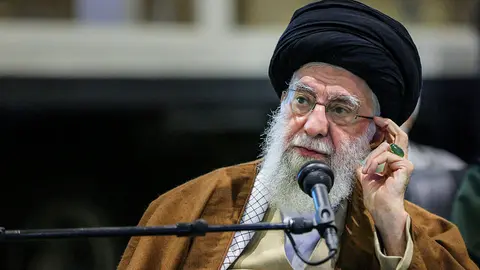Qatar’s Syrian endgame

Hay’at Tahrir al-Sham, with its well-known loyalty to both Türkiye and Qatar, could not have moved its troops without Qatari instructions.
Funding for the Free Syrian Army is part of a budget allocated by Doha since the Qatari leadership decided to overthrow President Assad at the beginning of the civil war.
If Syrian President Bashar al-Assad could turn back time by two weeks and have a chance to understand the significance of the recent signals from Turkish President Recep Tayyip Erdogan calling on him to open a new page in relations between the two countries, the situation would be different today in Syria and he would not have been overthrown if he had to leave the country.. Erdogan, regardless of his real or supposed flaws, has the merit of political clarity.
His political record, especially as a leader of Turkish Islamists and as president of the country, shows that he hardly conceals his plans. But Assad was not paying attention. The signals that Erdogan was sending illustrated well the state of political and strategic chaos in the region today. Some like to say that “the enemy of my friend is my enemy,” or that “the friend of my enemy is my enemy” or use these terms in any combination to describe the endless wavering between neighbours, allies, enemies, and friends alike. In the current situation in the region, any combination could be valid; valid to the extent that “my enemy is also my friend,” or “my friend is the enemy of my friend.” The hypothetical situations are endless amid the swirling uncertainties.
Two weeks ago, the Emir of Qatar, Sheikh Tamim bin Hamad Al Thani, arrived in Türkiye and held a “periodic” meeting with Turkish President Erdogan. Only generalities surfaced from the meeting, an odd meeting. The world was during the wars in Lebanon and Gaza, and Qatar was involved in both wars, and at least as party to the Gaza ceasefire talks. The Qataris withdrew from the truce negotiations between Israel and Hamas and waited for the ceasefire between Israel and Hezbollah to be announced. An agreement was bound to be reached regardless of when that was to be the case. Events went as expected and the Lebanon war eventually came to a halt and Israel’s focus was again on Gaza.
Two weeks ago, the Emir of Qatar, Sheikh Tamim bin Hamad Al Thani, arrived in Turkey and held a “periodic” meeting with Turkish President Erdogan. Only generalities surfaced from the meeting, a rather odd meeting. The world was during the wars in Lebanon and Gaza, and Qatar was involved in both wars, and at least as party to the Gaza ceasefire talks. The Qataris withdrew from the truce negotiations between Israel and Hamas and waited for the ceasefire between Israel and Hezbollah to be announced. An agreement was bound to be reached regardless of when that was to be the case. Events went as expected and the Lebanon war eventually came to a halt and Israel’s focus was again on Gaza.
The Qataris, who worried that the Israelis would eventually turn to settling their old scores with Doha, sought a place for themselves in the crisis without becoming a direct protagonist. The emir of Qatar undoubtedly asked his aides: “What do you think? Is it the right time now for them to enter the stage?” The answer would have been: “Yes; it is the right time for Hay’at Tahrir al-Sham’s to play its role. We have invested in it for a long time and created (using the description of the Syrian expert Malik al-Abdeh) our Sunni version of Hezbollah with Abu Muhammad al-Julani becoming the equivalent of Hassan Nasrallah.”
What worries the Israelis now is that Hezbollah could regain its supply line from Iran via Iraq. This supply line could allow Hezbollah to replace the equipment and missiles it lost in the war with Israel. This line today starts in Mosul and Sinjar crossing into Syrian territory before reaching the border crossings between Syria and Lebanon. This line is important because it is located on busy roads and it is difficult to distinguish there between the various shipments going through them, unlike the desert roads in the Syrian Badia on the eastern border with Iraq, in the Deir ez-Zor region and its environs. There, Israeli fighter planes or drones can easily detect shipments and target them at any moment of the day or night. The northern line that reaches Aleppo (or passes through it) provides better cover as a route for supplying weapons, equipment, and food to Iranian, Iraqi and loyalist militias from regional countries. Whoever wants to gain a brownie point of “goodwill” with Israel must act within this geography. This is what Qatar did as it activated one of the most important Syrian opposition actors, Hay’at Tahrir al-Sham (HTS).
Experts familiar with the situation in Syria do not hesitate to say that HTS and al-Julani received the green light from Turkey to carry out their offensive towards Aleppo and control its surrounding areas, including what remained in the hands of the Syrian forces in the Idlib countryside and the roads leading to Homs and Hama.
Experts are unsure if the green light was part of a Turkish Qatari decision aimed at hitting more than one target.
HTS, a former al-Qaeda affiliated group with its well-known loyalty to both Türkiye and Qatar, could not have moved without Qatari instructions.
Given the circumstances: who could pay the cost of fuel and food for tens of thousands of HTS fighters at a time when Türkiye is complaining about its spending on the Syrians? One of the goals of Erdogan’s attempt at reconciling with Assad was to ease such a burden.
The more you look at the size of the forces involved, estimated at 30,000 veterans of the Syrian civil war, with perhaps even more troops from the Free Syrian Army, the more you realise that funding is the lifeblood of the war effort.
Funding for the Free Syrian Army is part of a budget allocated by Doha since the Qatari leadership decided to overthrow President Assad at the beginning of the civil war, back to 2011. There was no clearer evidence of Qatar’s opposition to opening a new chapter with Assad (even if it did turn the page with Hezbollah) than Sheikh Tamim’s refusal to shake hands with Assad at many a summit meeting in the Gulf. He even went as far as to leave each venue where the Syrian president was about to speak.
Qatar sought a gift which it could present to Israel in its quest for forgiveness for its support for and funding of Hamas over the years, Doha having contributed, in one way or another, to providing salaries for Hamas fighters and the militant group’s building of tunnels. Not much is known about its assistance to Hamas in terms of the purchase of weapons. If Iran paid for the rifles and the triggers, Qatar did foot the bill for the salaries of the fighters carrying those rifles and pulling those triggers.
The world ignored the Turkish position on Gaza if it remained rhetorical. Furthermore, there was no Turkish position on events in Lebanon at all.
But the Israeli day of reckoning for the Qataris was looming on the horizon. In this regard, the Qataris did not care about stepping on Iranian toes as they sought to save their own skin. Besides, there is no love lost between them and Assad. Iran, which is not about to clash with Doha, was likely to keep quiet no matter what the Qataris did about Assad. The Qataris stood to gain a lot from targeting the Syrian regime and buying Israeli satisfaction, or at least stalling with the Israelis until the picture is clearer after the inauguration of the Trump administration.
The Qatari silence on what was happening in Syria was, so to speak, deafening. It was about Aleppo, Idlib’s neighbouring region on the border with Türkiye. It has been the most critical area of influence for Doha since 2011. This is the area where the Qataris exercised their strategic patience, spent, and continue to spend billions despite the war having practically stopped for years. This is the right time to play that card and cash it is in.
This is not to accuse Qatar of plotting against Syria, but there is no doubt that Doha had a plan against the Syrian regime. Not everything about this plan was known, but it has certainly been carried out, whether senior Qatari officials admit it or not. In any case, Doha continued to refuse to start a new chapter with Bashar al-Assad. No matter how you look at it, you will not be able to find a justification for this sudden and massive attack launched by the HTS group, even in terms of timing, unless you look at it from the angle that northern Syria is a card which the Qataris have kept in their possession (and perhaps left it as a trust or mortgage with the Turks).
The time to use it has now come. It is a card that is dear to the Qataris to the point that they kept it close to their chests throughout the previous phases of the conflict. They never revealed the reason for their special ties to the HTS, not even to their closest ally, Türkiye, nor to a transactional country like Russia.
One today can choose any combination of the words “my enemy,” “my friend” and “my ally.” They are all valid considering the current chaos. Also, one must decide to what extent such notions as reconciliation, appeasement or friendship have any reliable meaning when dealing with Qatar or Türkiye.


